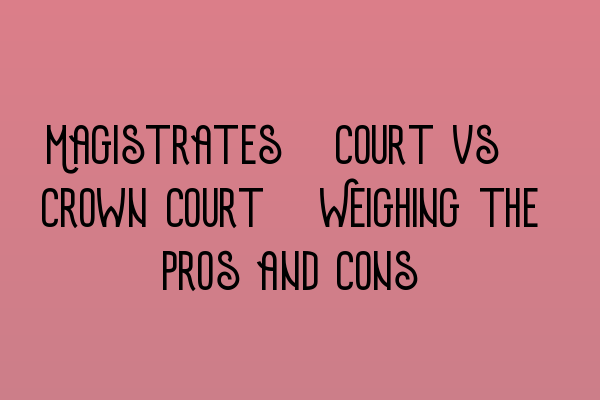Magistrates’ Court vs. Crown Court: Weighing the Pros and Cons
When it comes to the legal system in the United Kingdom, two important bodies play a crucial role in the criminal justice process: the Magistrates’ Court and the Crown Court. Understanding the differences between these two courts is essential for anyone involved in or seeking to understand criminal law and practice in the UK.
Magistrates’ Court
The Magistrates’ Court is the lower court in the UK’s criminal justice system. It handles the majority of criminal cases, including summary offenses and some less serious triable either-way offenses. The court consists of lay magistrates, who are not legal professionals, and a legally qualified magistrate called a District Judge. They are responsible for conducting trials, making decisions on bail, and issuing fines and other penalties. The Magistrates’ Court provides a fast and cost-effective way of handling criminal cases.
One of the key advantages of the Magistrates’ Court is its efficiency in dealing with minor offenses. Cases can be resolved relatively quickly, which may reduce the emotional and financial burden for both the accused and the victims. Additionally, being a part of the Magistrates’ Court may offer an opportunity for defendants to have their case heard by individuals from their own community, which can help in understanding the local context.
However, the Magistrates’ Court does have some limitations. Since the magistrates are not legal professionals, they might lack the deep legal knowledge and experience that a Crown Court judge possesses. This could potentially affect the quality of legal representation and decision-making. Furthermore, the Magistrates’ Court has limited sentencing powers, meaning they can only impose certain penalties. For more serious offenses, the case will be transferred to the Crown Court.
Crown Court
The Crown Court, on the other hand, deals with more serious criminal cases, such as indictable offenses and complex triable either-way offenses that have been sent by the Magistrates’ Court. The Crown Court consists of a judge and a jury, who play a pivotal role in the decision-making process. The judge has extensive legal knowledge and expertise and is responsible for guiding the jury, ruling on legal matters, and imposing appropriate sentences.
One significant advantage of the Crown Court is the quality of legal representation. Defendants have access to skilled barristers who specialize in criminal law trials, ensuring a robust defense. Additionally, the Crown Court has greater flexibility in sentencing, allowing for more tailored and proportionate penalties. The presence of a jury also adds an element of public scrutiny and accountability to the proceedings.
However, the Crown Court also has its drawbacks. The process can be lengthy and more expensive compared to the Magistrates’ Court. This may cause delays in resolving cases, resulting in additional stress for both the accused and the victims. The involvement of the jury, although valuable in terms of public participation, can make the decision-making process more unpredictable.
Ultimately, the choice between the Magistrates’ Court and the Crown Court depends on the nature and severity of the criminal offense. While the Magistrates’ Court offers efficiency and community connection for less serious cases, the Crown Court provides a higher level of legal expertise and flexibility for more complex matters.
As an aspiring legal professional, it is important to have a comprehensive understanding of both court systems and their respective advantages and disadvantages. By following SQE (Solicitors Qualifying Examination) preparation courses, you can gain the necessary knowledge and skills to navigate these courts successfully. To prepare for the SQE exam, using resources such as practice exams and mock quizzes can immensely help in familiarizing yourself with the exam format and content. Be sure to check out the following related articles for more information:
- SQE 1 Practice Exam Questions
- SQE 1 Practice Mocks FLK1 FLK2
- SQE 2 Preparation Courses
- SQE 1 Preparation Courses
- SRA SQE Exam Dates
By staying informed and adequately prepared, you can confidently navigate the complexities of the Magistrates’ Court and the Crown Court, and ultimately contribute to a fair and just legal system.
